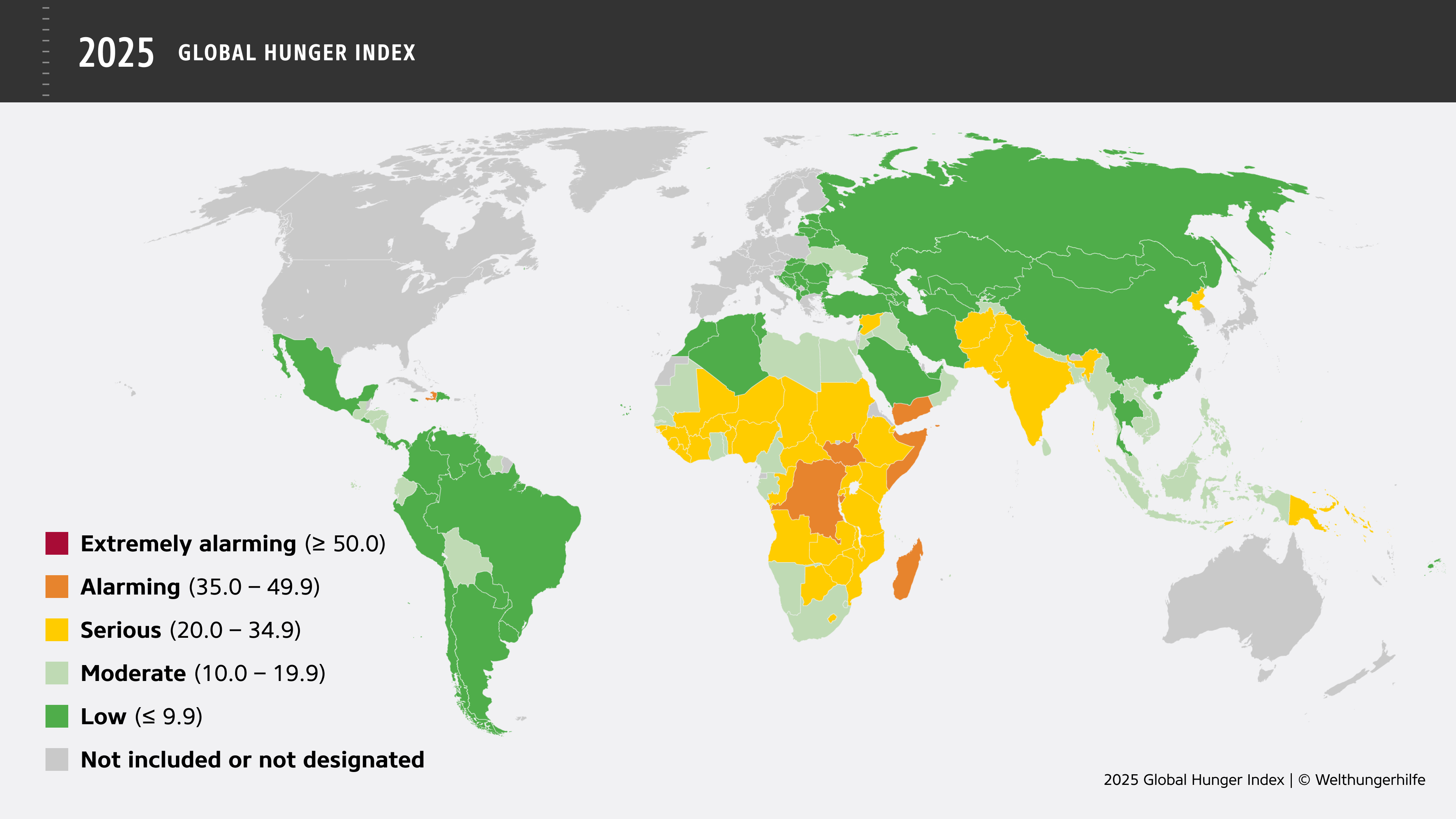The Global Hunger Index (GHI) 2025, published on Thursday, paints a bleak picture of the world's progress towards the United Nations' Sustainable Development Goal (SDG) of achieving zero hunger by 2030. With at least 56 countries projected to miss the low hunger threshold, and 42 currently experiencing serious or alarming levels of hunger, the report emphasizes the need for renewed commitment and urgent action.

According to the GHI, published by the Irish humanitarian organization Concern Worldwide, the German aid agency Welthungerhilfe, and the Institute for International Law of Peace and Armed Conflict (IFHV), the global GHI score has barely improved since 2016. This lack of progress is attributed to overlapping and accelerating global crises, including armed conflict, climate shocks, economic fragility, and political disengagement.
The report warns that, at the present rate of progress, it will take more than a hundred years to reach low hunger levels globally.
“At the current pace, at least 56 countries will not reach low hunger — let alone Zero Hunger — by 2030,” warned Réiseal Ní Chéilleachair, Concern Worldwide Director of Strategy, Advocacy and Learning, during the report's launch.
“If progress remains at the pace observed since 2016, low hunger at the global level may not be reached until 2137 — more than a century away.”
The report emphasizes the urgent need for action in countries such as Burundi, the Democratic Republic of the Congo (DRC), Haiti, Madagascar, Somalia, South Sudan, and Yemen, where the level of hunger is considered alarming. Additionally, 35 countries experienced serious levels of hunger.
The report’s authors express concern about data gaps that prevented GHI scores from being calculated for Sudan, the Occupied Palestinian Territories (including Gaza), Yemen, Burundi, and the Democratic People’s Republic of Korea (DPRK).
According to the GHI, these gaps obscure the true extent of hunger in these countries, though available indicators point to deteriorating conditions, suggesting that the reality is more alarming than current figures reveal.
The Integrated Food Security Phase Classification (IPC), the world’s leading authority on acute food security, reports that man-made famines are currently occurring in Sudan due to the war that erupted in 2023, resulting in the world's largest hunger crisis, and in the Gaza Strip due to Israeli blockades and obstructions to humanitarian aid and commercial goods.
“Wars such as those in the Gaza Strip and Sudan have led to catastrophic famines. Decisive action and international political commitment are needed to overcome hunger,” said Mathias Mogge, Secretary General of Welthungerhilfe.
In contrast, parts of South and Southeast Asia, as well as Latin America, have reduced hunger due to stability and investment, according to the GHI. Sustained investments can drive meaningful progress in hunger reduction, as demonstrated in Angola, Bangladesh, Ethiopia, India, Nepal, and Sierra Leone.
Chéilleachair stressed that “hunger is not inevitable. It is a result of the lack of sustained political will, policy failure, policy financing, and implementation.”
“Progress is evident in a number of countries, the report shows, especially on undernourishment. The international community needs to re-energize, re-commit and re-focus its efforts to tackle global hunger levels, prioritizing communities and people who are most affected,” she added.
The report notes that the lack of progress toward achieving the SDG is evidence of leaders’ policy ambivalence, as stated ambitions are not being met with adequate resources or actions.
“Putting it in simple terms, talk is not being backed by action,” Chéilleachair said.
Rather than correcting their course, many decision-makers are ignoring or underinvesting in commitments they have already made. They are doubling down on destabilizing policies. Vital monitoring and early-warning systems used to track hunger are being undermined by security risks, bureaucratic impediments, and funding cuts that hinder aid delivery and data collection.
The GHI 2025 is being published at a time when humanitarian funding is being cut drastically and military spending is on the rise. Humanitarian assistance is increasingly limited to the most acute cases only, leaving millions without support.
“Last year alone, wars triggered 20 acute hunger crises worldwide, affecting nearly 140 million people. At a time when challenges are increasing, the financial resources needed to overcome hunger worldwide are being cut,” said Marlehn Thieme, chair of the board of Welthungerhilfe.
“The German government should reverse the planned cuts to humanitarian assistance in the 2026 budget — otherwise it is the most vulnerable who will pay the price.”
This year's GHI includes a total of 136 countries. While countries in Sub-Saharan Africa and South Asia continue to have the worst GHI scores, the main causes of global hunger remain ongoing wars and armed conflicts, the consequences of climate change, and a lack of political will to act.
The report ranks countries based on four key indicators: undernourishment, child stunting, child wasting, and child mortality. Countries receive a score on a 100-point scale measuring the severity of hunger, with zero representing no hunger and 100 representing the worst conditions.
Further information
Full text: Global Hunger Index 2025, Concern Worldwide, Welthungerhilfe, Institute for International Law of Peace and Armed Conflict (IFHV), report, published on October 9, 2025
https://www.globalhungerindex.org/pdf/en/2025.pdf
Website: Global Hunger Index (GHI)
https://www.globalhungerindex.org/